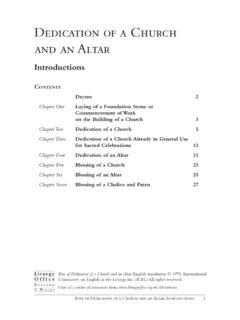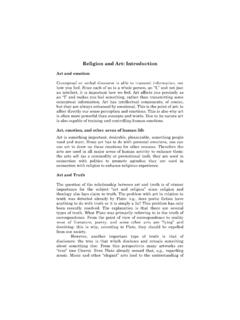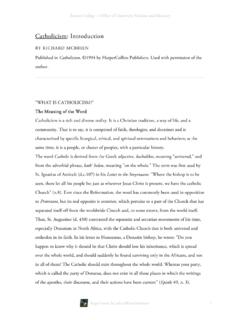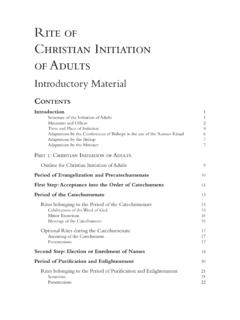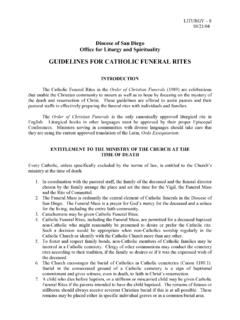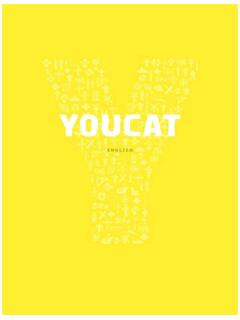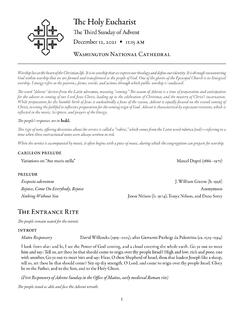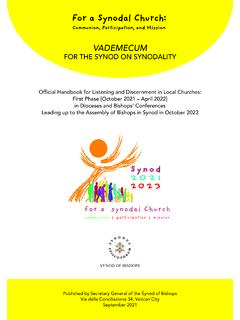Transcription of The Catholic Mass Booklet - SIC DEUS DILEXIT MUNDUM
1 Prepared by Fr. Ryan Browning, 20 The Catholic mass Booklet The Order of mass Introductory Rites: Priest: In the name of the Father, and of the Son, and of the Holy Spirit. [All make the sign of the cross. We make the sign of the Cross for two reasons: we are expressing our desire to be set apart from the corrupt ways of the world, and to invoke God s protection for our lives.] (Matt 28:19; Jn 14:13-14; Acts 2:21; also Ez 9:4-6; Rv 9:4) All: Amen. Priest: The grace of our Lord Jesus Christ and the love of God and the communion of the Holy Spirit be with you all. (2 Cor: 13:13) All: And with your spirit (Gal 6:18; 2 Tim 4:22) [this acknowledges the Holy Spirit s unique activity through the priest during the sacred liturgy by virtue of his ordination.]
2 ] Penitential Rite: Option A: Priest: Brothers and sisters, let us acknowledge our sins, and so prepare ourselves to celebrate the sacred mysteries. (Ps 51:5) All: I confess to almighty God, and to you, my brothers and sisters, 2 The letters of Paul are already considered scripture (2 Peter 3:15-17; cf. 1 Thess 5:27; Col 4:16) 19 Use of Scripture in Early christian Worship: From the very beginning, christian worship has not only involved the sharing of bread and wine in a ritual meal, but also included readings from the sacred scriptures (as was and is also done in Jewish synagogue services). Early Christians not only read from the Jewish scriptures, but soon also included some writings of christian leaders: James says the books of Moses have been read aloud in Jewish synagogue services for many generations (Acts 15:21) Jesus reads from the book of the prophet Isaiah during a synagogue service (Luke 4:16-22, citing Isa 61:1-2) The risen Jesus explains the meaning of the scriptures to two disciples on the road to Emmaus (Luke 24:25-47) The apostles base their preaching on the scriptures (Acts 2:14-36; 7:2-53; 17:1-11) Christians read from the books of the Law and the Prophets (Acts 13:15-44) Christians sing the Psalms and other hymns in their worship (Col 3:16.)
3 Eph 5:18-20) The scriptures are applied to all aspects of christian life (1 Tim 4:13; 2 Tim 3:16-17) 18that I have greatly sinned, in my thoughts and in my words, in what I have done, and in what I have failed to do, (striking breast say:) Through my fault, through my fault, through my most grievous fault; (then continue) Therefore I ask blessed Mary ever-Virgin, all the angels and saints, and you, my brothers and sisters to pray for me to the Lord our God. (Lev 5:5; Neh 1:5-9; Dan 9:3-19; James 5:16) Priest: May almighty God have mercy on us, forgive us our sins, and bring us to everlasting life. All: Amen. Option B: Priest: Brothers and sisters, let us acknowledge our sins, and so prepare ourselves to celebrate the sacred mysteries. Priest: Have mercy on us, O Lord All: For we have sinned against you.
4 (Ps 41:4) Priest: Show us O Lord, your mercy All: And grant us your salvation. Priest: May almighty God have mercy on us, forgive us our sins, and bring us to everlasting life. All: Amen. 3 Option C: Priest: Brothers and sisters, let us acknowledge our sins and so prepare ourselves to celebrate the sacred mysteries. [The following or other invocations may be spoken by the priest or deacon, but the priest always gives the final blessing.] Priest: You were sent to heal the contrite of heart. Lord, have mercy. All: Lord, have mercy. (Matt 15:22, 17:15, 20:30-31) Priest: You came to call sinners: Christ, have mercy. All: Christ, have mercy. (Ps 123:3) Priest: You are seated at the right hand of the Father to intercede for us: Lord, have mercy. All: Lord, have mercy.
5 Priest: May almighty God have mercy on us, forgive us our sins, and bring us to everlasting life. All: Amen. Kyrie: Priest: Lord, have mercy. All: Lord, have mercy. Priest: Christ, have mercy. All: Christ, have mercy. Priest: Lord, have mercy. All: Lord, have mercy. or 4 Prophet Elisha feeds 100 men with very little food (2 Kings 4:42-44) Jesus feeds 5000 people in Galilee (Mark 6:30-44; Matt 14:13-21; Luke 9:10-17; John 6:1-14) Jesus feeds another crowd of 4000 people (Mark 8:1-10; Matt 15:32-39) Jesus tells many parables involving meals and banquets (Matt 22:1-14; 25:1-13; Luke 12:35-40; 14:15-24; etc.) Jesus has many meals with disciples and others (Mark 2:15-20; 14:3-9; Luke 14:1-14; etc.) Jesus shares his Last Supper with his disciples (Mark 14:12-27; Matt 26:17-30; Luke 22:7-39; cf.)
6 1 Cor 11:23- 25) The Risen Jesus shares a meal with two disciples at Emmaus (Luke 24:13-35) The Risen Jesus has breakfast with disciples at the Sea of Galilee ( John 21:1-14) Early Christians in Jerusalem share in the "Breaking of the Bread" (Acts 2:42-47) Early Christians in Troas "break bread" with Paul (Acts 20:5-11) Early Christians in Corinth celebrate the "Lord's Supper" (1 Cor 10:16-17; 11:17-34; cf. Rev 19:9) 17 Biblical Background for the Eucharist: The word " mass " comes from the Latin word, " Missa." In the Latin, the faithful were dismissed with the words "Ite, missa est" (literally meaning "Go, she meaning you, the Church has been sent"). The word "Missa" is related to the word "missio," the root of the English word "mission." The liturgy does not simply come to an end.
7 Those assembled are sent forth to bring the fruits of the Eucharist to the world. The mass is not only based on the "Last Supper" that Jesus had with his disciples, but is also influenced by a long history of special meals celebrated by ancient Jews (including Jesus) and early Christians, both before, during, and after the lifetime of Jesus: Abraham and Melchizedek share bread and wine (Gen 14:18-20) Abraham provides a meal for the Three Visitors (Gen18:1-8) Israelites in Egypt celebrate the first Passover (Exod 12:1-28) Israelites annually share Passover meals (Exod 12:43-51; Lev 23:4-14; Num 9:1-14;28:16-25; Deut 16:1-8) Israelites annually celebrate the feast of Unleavened Bread (Exod 12:14-20; 13:3-10; 23:14-15; 34:18; etc.) 16 Priest: Kyrie, eleison.
8 All: Kyrie, eleison. Priest: Christe, eleison. All: Christe, eleison. Priest: Kyrie, eleison. All: Kyrie, eleison. (You may have heard that some parts of the Catholic mass may be in Latin. The above is the exception, which, when recited, is in Greek, the original language of the New Testament.) Gloria: All: Glory to God in the highest, (Luke 2:14; Rev 4:11, 5:11-14) and on earth peace to people of good will. We praise you, (Ps 148:13) we bless you, we adore you, we glorify you, we give you thanks for your great glory, Lord God, heavenly King, O God, almighty Father. Lord Jesus Christ, Only Begotten Son, (Ps 2:7) Lord God,Lamb of God, Son of the Father, you take away the sins of the world, ( John 1:29) have mercy on us; you take away the sins of the world, receive our prayer; You are seated at the right hand of the Father, 5have mercy on us.
9 For you alone are the Holy One, you alone are the Lord, you alone are the Most High, Jesus Christ, with the Holy Spirit, in the glory of God the Father. Amen. Collect ( k l ekt): (It is called the collect because in it the priest collects the prayers of the faithful and offers them to God through the words of the Church.) Priest: Let us pray. [different prayer depending on the liturgical season, saint of the day, or special mass ] All: Amen. (Neh 8:6; Ps 41:13;Rom 16:27; Heb 13:20-21; Rev 7:16) [Everyone sits for the first reading, psalm, and second reading] First Reading: Lector: A reading from the Book (or Letter, or Acts) [reads the word of God, see hymnal for readings based on day and season] Lector: The Word of the Lord. (1 Peter 1:25) All: Thanks be to God!
10 (Rom 6:17; Cor 9:15) Responsorial Psalm: [The choir and/or cantor sing or recite the psalm; the people join in the repeated response.] 6explanation on the belief, we suggest reading a copy of Jesus and the Jewish Roots of the Eucharist by Brant Pitre.) Prayer after Communion: Priest: Let us pray. [stand] All: Amen. Priest: The Lord be with you. All: And with your spirit. Priest: May almighty God bless All: Amen. Blessing: (Gen 28:3; Deut 14:29; Num 6:23-27; Ps 29:11) Priest: May Almighty God bless you the Father, and the Son, and the Holy Spirit. All: Amen. Priest: Go in the peace of Christ. or Go forth, the mass is ended. or Go and announce the Gospel of the Lord. (Mark 16:15) or Go in peace, glorifying the Lord by your life. (Ps 115:1; 1 Cor 10:31; 2 Thes:1:12) or Go in peace.
